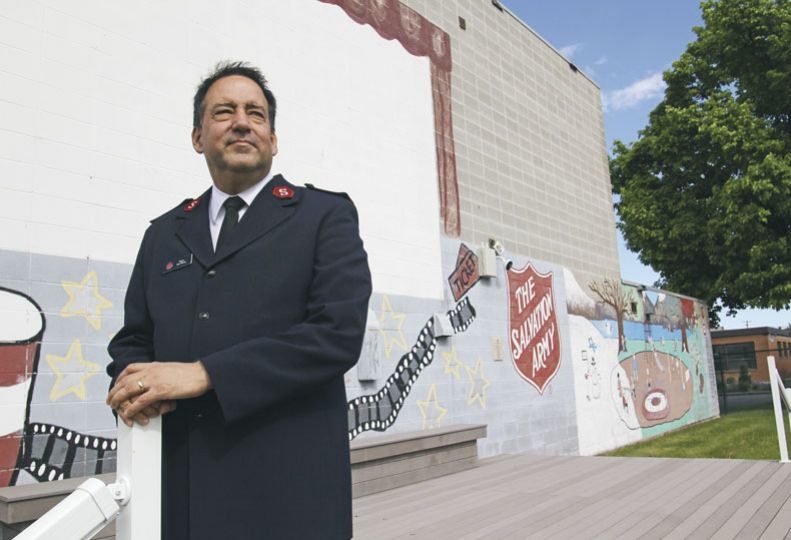
Home » Salvation Army considers affordable housing development
Salvation Army considers affordable housing development
Portion of rents would go toward down payments for permanent homes

May 25, 2023
The Salvation Army Spokane Citadel Corps has evolved and adapted its services to meet the needs of the community for over a century, and now leaders from the charitable organization hope to build workforce housing that leads to permanent homeownership.
“That’s the vision I see for the future,” says Maj. Ken Perine, executive director and corps officer for Salvation Army Spokane. “To get there, we’ll need some other visionary leaders and donors to come alongside (us).”
Perine’s vision would create a three-story workforce complex with commercial space on the ground floor, and a minimum of 40 units combined on the second and third floors.
The complex would be along Division Street on the west end of the Salvation Army property located at 222 E. Indiana, in Spokane’s Logan neighborhood.
The multifamily units would be rented at market rate. According to Perine’s vision, however, after five years, the Salvation Army Spokane would return a third to half of a household’s rent payments to be used toward a down payment on a home, says Perine.
“It’s been a four-year plan with 2 1/2 years being COVID, but we can get there. We just need the right people to come alongside and really make it happen,” he says.
The Salvation Army Spokane is the local chapter of the international Christian-based charitable organization first formed in London in 1865.
Its roots in Spokane began in 1891, just 10 years following the city’s founding. The organization moved around before settling at 245 W. Main in 1919. It has been based at its current Indiana Avenue location since 1972.
The Salvation Army Spokane has a staff of about 200 full- and part-time workers and an 18-member board within the Spokane-Coeur d’Alene area. As Salvation Army Spokane’s lead pastor, Perine says he’s not employed directly by the organization, but receives an allowance for his time, which averages out to about $13 an hour.
Salvation Army Spokane’s projected annual revenue for fiscal year 2022 is $18.6 million, an increase from the year-earlier revenue of $17.6 million.
From the outset, the social-service organization has been focused on feeding, clothing, and providing shelter to the community through its core programs, which have adapted over time.
One early example was the Booth Women’s Home & Hospital, which was located at 3400 W. Garland and provided shelter for unwed, expectant mothers.
“The care is still there. How it’s done is different,” says Perine.
Today, expectant mothers in similar situations have other medical resources that can help them, he says.
The way in which people experiencing homelessness are directed toward housing programs also has changed, says Perine.
He notes that in the past, homeless people were given four choices, which included leaving town, “pulling it together,” going to jail, or going to the Salvation Army.
“Today, there is no legal impetus for people leaving the streets, and it does affect how we do business, how we help people,” he contends.
Currently there are 10 core programs offered by the Salvation Army Spokane. Two are foster care programs: Sally’s House, which takes in children 2 to 12 years of age; and Evangeline’s House, which serves youths ages 12 to 20.
In 2021, Sally’s House served 322 children who were referred to the emergency 90-day foster care program by law enforcement or Child Protective Services. Since opening its doors in 2002, it has served over 7,000 children and provided 276,600 meals. Evangeline’s House opened in 2018 and has served over 150 youths.
Salvation Army Spokane also runs housing programs for homeless families and individuals. They include the Stepping Stones program and the Family Emergency Safe Shelter.
Stepping Stones is a transitional housing program that serves families meeting the U.S. Department of Housing and Urban Development’s standards for very low to low income for Spokane County. Families are allowed to reside in the transitional housing program for up to two years while they work to find affordable housing, pay off debts, and overcome other problems that may have contributed to homelessness.
The Family Emergency Safe Shelter has 12 fully furnished studio units where homeless families can stay for up to 90 days.
All guests staying in the housing programs are required to complete 16 hours of community service per month, says Perine.
“The goal is restoring a healthy community,” he says.
Perine says there currently is no funding for the type of housing he envisions to build on the Salvation Army Spokane property.
Perine says his vision for restoring community and helping families and individuals experiencing unstable housing and homelessness requires a larger sum of money directed to be used solely for a down payment on a house.
He estimates that a three-bedroom apartment at $1,200 per month, for 60 months might generate a down payment in the neighborhood of $36,000.
For such a vision, Perine says Salvation Army Spokane would need to partner with private investors as opposed to relying on government funding that would limit the organization’s ability to direct the funds for a specific purpose.
“I want to be able to give that kind of next step for folks who are working hard,” he says. “The goal of the program would be to help people become even stronger members of our community again.”
Latest News Up Close Real Estate & Construction
Related Articles
Related Events





